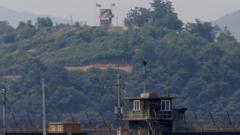South Korea's recent warning shots directed at North Korean troops crossing the border reflect escalating tensions between the two nations, especially as Pyongyang criticizes the South for provocation. This incident occurs against a backdrop of stalled reconciliation efforts under new South Korean President Lee Jae Myung.
Increased Border Tensions as South Korea Fires Warning Shots at North Korean Troops

Increased Border Tensions as South Korea Fires Warning Shots at North Korean Troops
South Korean military issues warning shots as North Korean soldiers cross the border, escalating tensions amid stalled diplomatic efforts.
South Korea has confirmed that it fired warning shots earlier this week toward North Korean soldiers who briefly crossed the heavily fortified border separating the two nations. North Korean state media reacted by labeling the shots as a "deliberate provocation," warning that the actions by Seoul could lead to "uncontrollable" tensions on the Korean peninsula.
This incident coincides with the trip of newly elected South Korean President Lee Jae Myung to Tokyo and Washington, marking a critical time for inter-Korean relations. Despite his campaign promises to improve ties with North Korea, recent events indicate a sharp downturn in communication and cooperation, particularly illustrated by Kim Jong Un's sister rebuffing reconciliation offers from Lee's administration.
The border incident took place amidst ongoing efforts by North Korea to reinforce its border security since last year. The area known as the Demilitarised Zone (DMZ) serves as a no-man's land between North and South Korea, where intrusions can escalate tensions. According to South Korea's Joint Chiefs of Staff (JCS), North Korean troops crossed the military demarcation line around 15:00 local time on Tuesday, before retuning to the northern part of the line.
State media reported that North Korean Army Lt Gen Ko Jong Chol characterized the warning shots—which included over 10 machine gun rounds fired by the South—as a serious prelude to potential escalation, intensifying military confrontations in the border area.
Despite the recent election victory of President Lee, who had sought to restore inter-Korean dialogue, the relationship remains strained. Earlier this month, South Korea's military announced the suspension of loudspeaker propaganda broadcasts directed at North Korea, an attempt to build trust that Pyongyang has previously condemned as warfare.
The two Koreas have remained technically at war since the Korean War ended in 1953 without a peace treaty, and recent developments indicate that the path to reconciliation is fraught with challenges and dangers.
This incident coincides with the trip of newly elected South Korean President Lee Jae Myung to Tokyo and Washington, marking a critical time for inter-Korean relations. Despite his campaign promises to improve ties with North Korea, recent events indicate a sharp downturn in communication and cooperation, particularly illustrated by Kim Jong Un's sister rebuffing reconciliation offers from Lee's administration.
The border incident took place amidst ongoing efforts by North Korea to reinforce its border security since last year. The area known as the Demilitarised Zone (DMZ) serves as a no-man's land between North and South Korea, where intrusions can escalate tensions. According to South Korea's Joint Chiefs of Staff (JCS), North Korean troops crossed the military demarcation line around 15:00 local time on Tuesday, before retuning to the northern part of the line.
State media reported that North Korean Army Lt Gen Ko Jong Chol characterized the warning shots—which included over 10 machine gun rounds fired by the South—as a serious prelude to potential escalation, intensifying military confrontations in the border area.
Despite the recent election victory of President Lee, who had sought to restore inter-Korean dialogue, the relationship remains strained. Earlier this month, South Korea's military announced the suspension of loudspeaker propaganda broadcasts directed at North Korea, an attempt to build trust that Pyongyang has previously condemned as warfare.
The two Koreas have remained technically at war since the Korean War ended in 1953 without a peace treaty, and recent developments indicate that the path to reconciliation is fraught with challenges and dangers.















